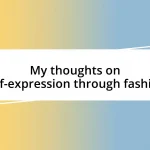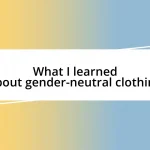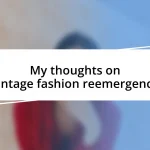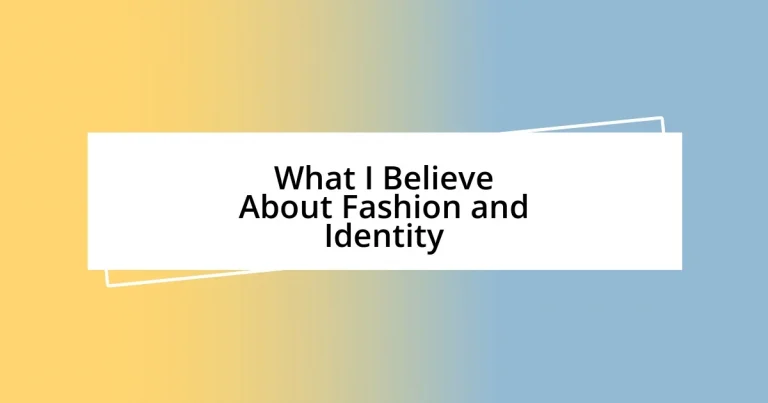Key takeaways:
- Fashion serves as a powerful reflection of identity, enabling personal expression and forging connections through style choices.
- Cultural influences in fashion highlight the connection to heritage and personal histories, acting as a bridge between modern identities and traditional roots.
- Building a personal fashion philosophy involves understanding one’s values and emotional states, allowing clothing choices to empower and reflect personal growth.
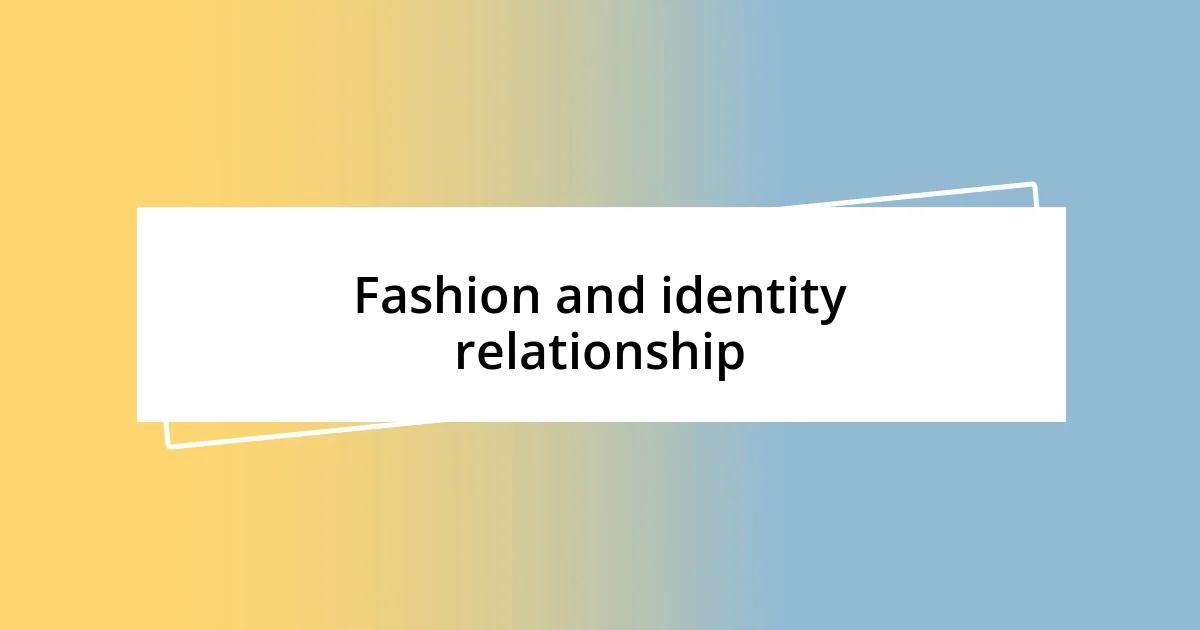
Fashion and identity relationship
Fashion is more than just clothing; it’s a reflection of who we are and who we aspire to be. I remember a time when I wore a vintage band t-shirt to a gathering, feeling a sense of belonging with others who shared my love for music. It struck me how our choices in style can forge connections, making us feel seen and understood in a world where it’s often hard to find that sense of community.
There’s a certain power in the outfits we choose. Have you noticed how slipping into a favorite dress or a tailored suit can completely change your demeanor? I find that specific pieces of clothing can evoke memories or emotions tied to significant events, almost acting as a bridge to our past selves. This connection paints a larger picture of our identity—one woven from experiences, aspirations, and even our cultural background.
When I think about identity, I can’t help but consider how fashion serves as both armor and expression. For instance, wearing bright colors might signal confidence, while opting for more muted tones could express introspection. It leads me to wonder: what stories do your clothes tell about you? Our wardrobes are like diaries, each piece revealing a chapter of our lives and the intricate relationship we have with our evolving selves.
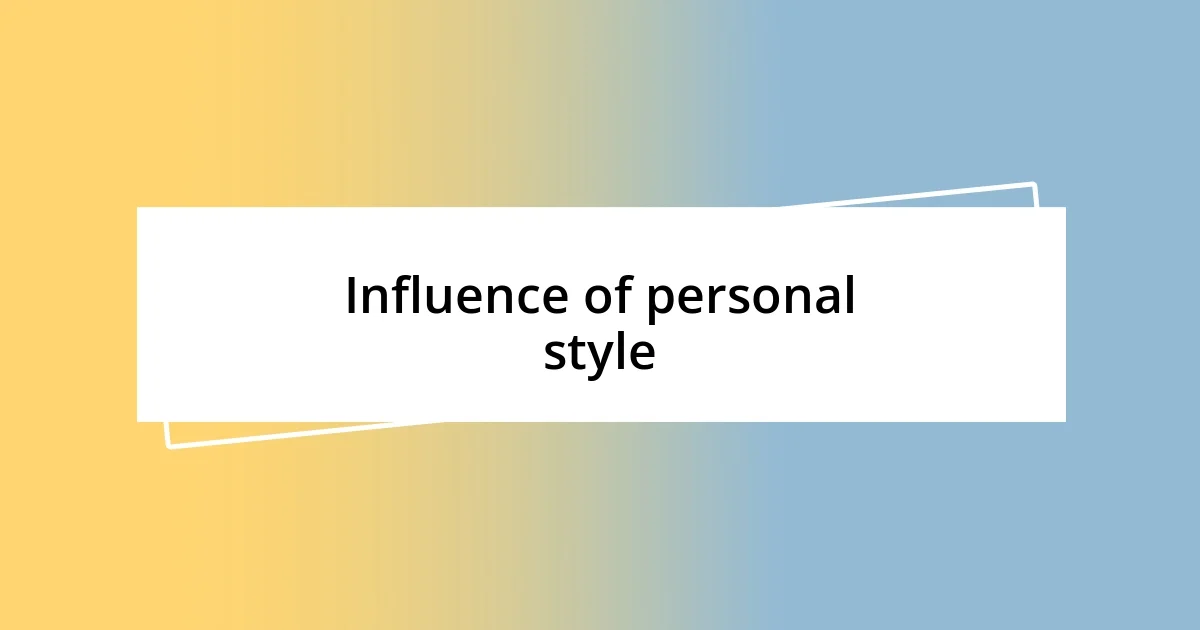
Influence of personal style
Fashion often acts as a canvas where we can paint our identities. I recall when I experimented with a bohemian look; wearing flowy skirts and layered jewelry made me feel adventurous and free-spirited. It was fascinating to observe how those outfits not only changed how others perceived me but also shifted my own self-perception. This transformation highlighted how personal style plays a pivotal role in shaping not just our identities but also the impressions we leave on others.
As I reflect on various fashion trends I’ve embraced, I can see how they intersect with different stages of my life. During a professional phase, I gravitated toward tailored blazers and polished shoes, which made me feel more mature and competent. In contrast, my casual looks, often featuring oversized sweaters and sneakers, brought a comforting sense of nostalgia, reminding me of carefree college days. Each style choice seemed to resonate with my emotional state, underpinning the importance of personal style as a vital expression of our identity.
I recently noticed how my accessories—which I once considered as mere embellishments—have grown to be significant components of my style narrative. For instance, the bold statement necklace I wear connects me to my grandmother, who always adorned herself in intricate jewelry. This reveals how personal style can intertwine with our histories, acting as a vessel for cherished memories and allowing us to carry pieces of our past into our present lives.
| Fashion Choices | Impact on Identity |
|---|---|
| Bohemian Look | Evoked feelings of freedom and adventure |
| Professional Attire | Signified maturity and competence |
| Casual Wear | Inspired nostalgia and comfort |
| Statement Accessories | Connected to cherished memories and family heritage |
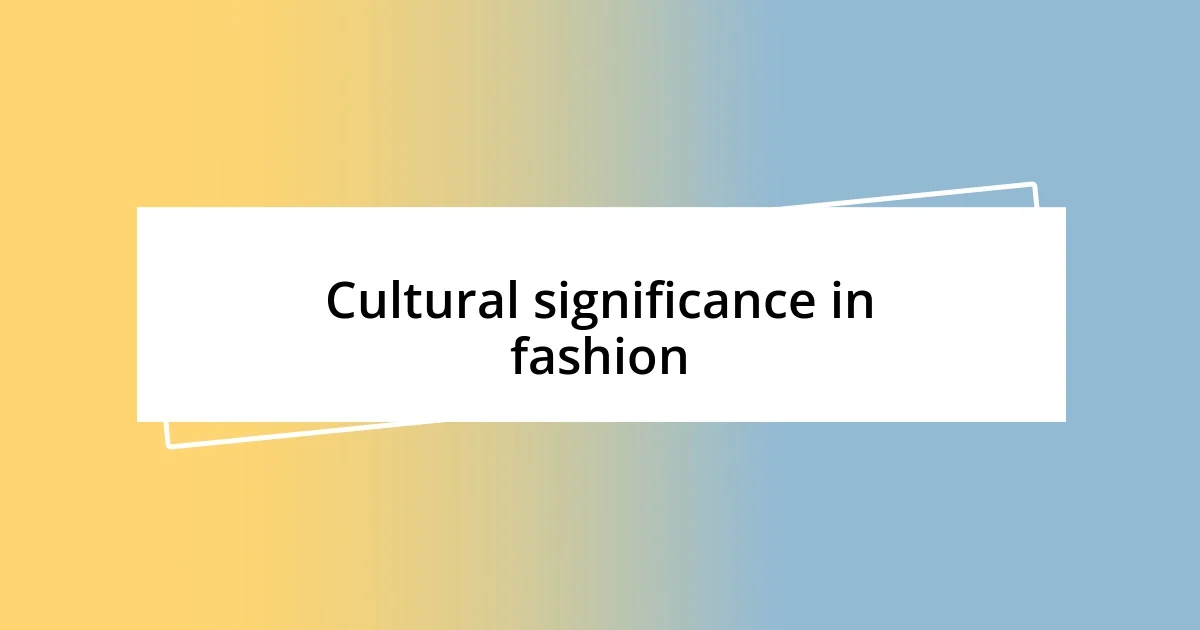
Cultural significance in fashion
Cultural influences on fashion are palpable, weaving together a rich tapestry of identity and expression. I was struck by this during a trip abroad when I donned a traditional garment from the local culture. The moment I put it on, I felt a deep connection to the history and values it represented. It highlighted how clothing can act as a bridge between modern life and cultural heritage, allowing us to carry our roots with us even when we step outside our comfort zones.
- Fashion serves as a visual dialogue of cultural stories.
- It enables expression of heritage and personal beliefs.
- Traditional garments foster connection between past and present.
- Fashion trends can dismantle cultural stereotypes and promote diversity.
- Personal experiences with culturally inspired outfits can reshape our perspectives.
Reflecting on my own experiences, I once participated in a cultural festival where I wore a vibrant sari. The way I felt in that attire—not just beautiful, but connected to a rich tradition—was eye-opening. Each fold of the fabric held stories of generations, emphasizing how fashion can illuminate our identities while celebrating our cultural ancestry.
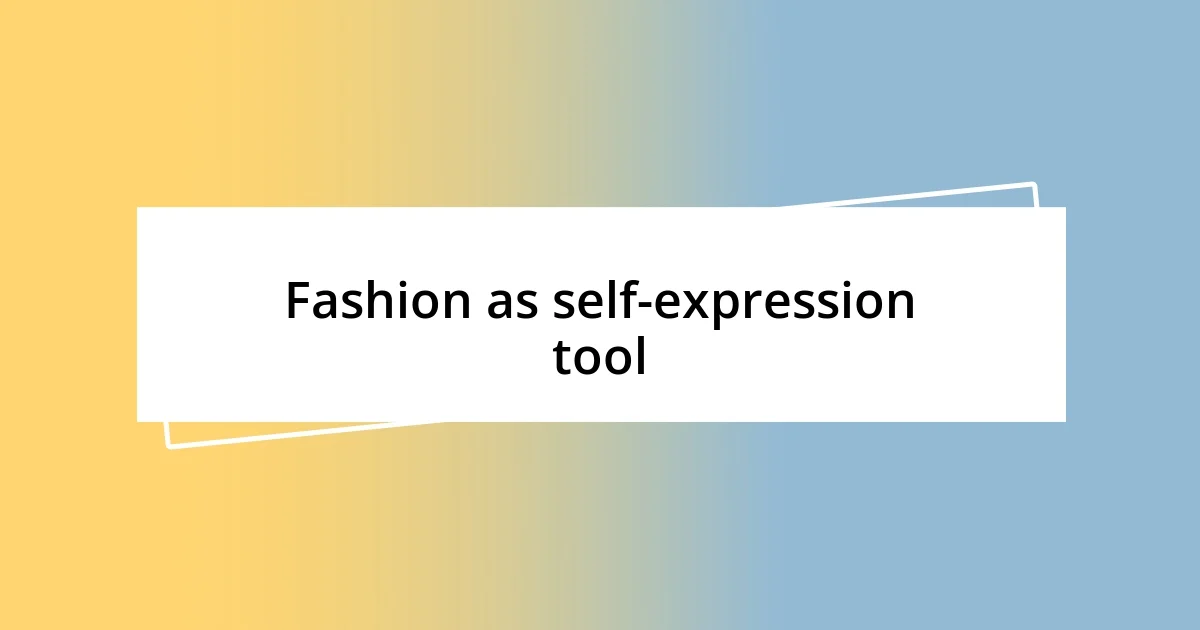
Fashion as self-expression tool
Fashion truly stands out as a powerful tool for self-expression. I remember wearing my favorite oversized denim jacket to a casual meet-up; it was more than just a clothing item—it was a statement. Wrapped in that jacket, I felt a surge of confidence and authenticity, as if it captured a piece of who I was at that moment. Doesn’t it make you wonder how an article of clothing can carry so much meaning?
When I switched to more eclectic patterns and bold colors, it was like opening a door to a new part of myself that I didn’t know existed. I could feel the energy shift around me; people started to engage differently, often complimenting my daring choices. This kind of feedback deepened my belief that our clothing choices can invite others into our personal stories. What about you? How does wearing certain clothes make you feel, and have you noticed how others react to different styles you sport?
I’ve observed that the journey of trying new fashion styles can be both liberating and revealing. One particularly distinct moment was when I decided to wear a vintage floral dress for a night out. The flirty fabric swished with each step, and I felt an unexpected blend of femininity and empowerment. It reminded me that fashion is not just about aesthetics; it reflects our evolving identities and our desire to connect with the world around us. Have you ever experienced a moment where clothing completely transformed your mood or perspective?
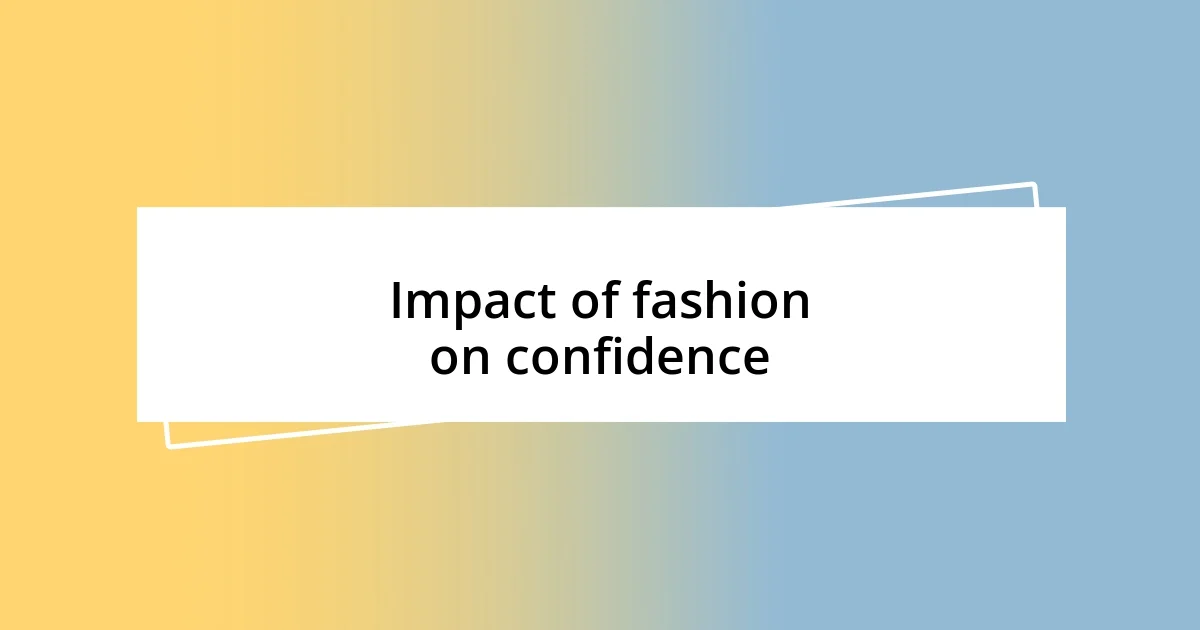
Impact of fashion on confidence
Fashion significantly shapes our confidence in nuanced ways. I remember a time when I wore a sharp blazer to an important presentation. Instantly, I felt more professional and poised. It was fascinating to realize how much my attire, something so external, could influence my internal state.
When I first experimented with a bold red lipstick, it was almost like wearing a badge of courage. I caught my reflection and felt empowered, as if I had transformed into a more self-assured version of myself. Isn’t it incredible how small details can yield such major changes in how we perceive ourselves?
I’ve also noticed that confidence can ebb and flow based on what I’m wearing. One day, I chose a casual outfit that felt comfortable but drab. Surprisingly, I felt less motivated. On another occasion, I threw on a vibrant scarf that instantly elevated my mood and presence. It makes me ponder—how often do we overlook the impact of our clothing choices on our self-esteem and interactions with others?
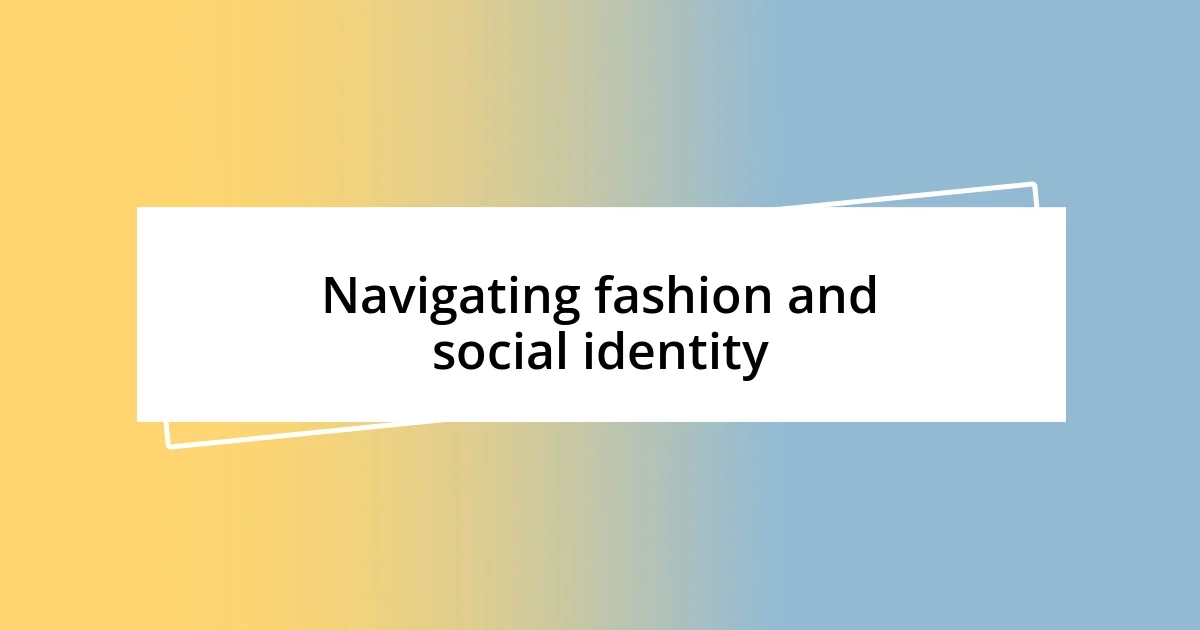
Navigating fashion and social identity
Navigating the relationship between fashion and social identity can be quite intricate. I recall attending a friend’s party where everyone was donning designer outfits. Feeling out of place in my vintage thrift-store find, I hesitated at first, but soon embraced my style. It sparked conversations about sustainability and individuality that I wouldn’t have experienced otherwise. Isn’t it interesting how sometimes, our choices can tell stories that challenge social norms?
One particular experience stands out to me when I wore a bright, patterned skirt to a family gathering. Instead of the usual neutral tones my relatives expected, my bold choice prompted discussions that dug deeper than surface-level fashion. Suddenly, I wasn’t just ‘the family member’—I was an advocate for personal expression and creativity. This made me realize that fashion can act as a bridge, helping us navigate and redefine social identities in the spaces we inhabit. How often do we rely on our clothes to communicate aspects of ourselves that words sometimes fail to convey?
I’ve found that the way I dress can also influence the dynamics of group interactions. For instance, during a collaborative project at work, I chose to wear a colorful graphic tee instead of the standard office attire. It created an atmosphere of openness, encouraging my colleagues to share ideas freely and think outside the box. This led me to ponder—what role does our clothing play in shaping not only our identity but also the identities we create in relation to others around us?
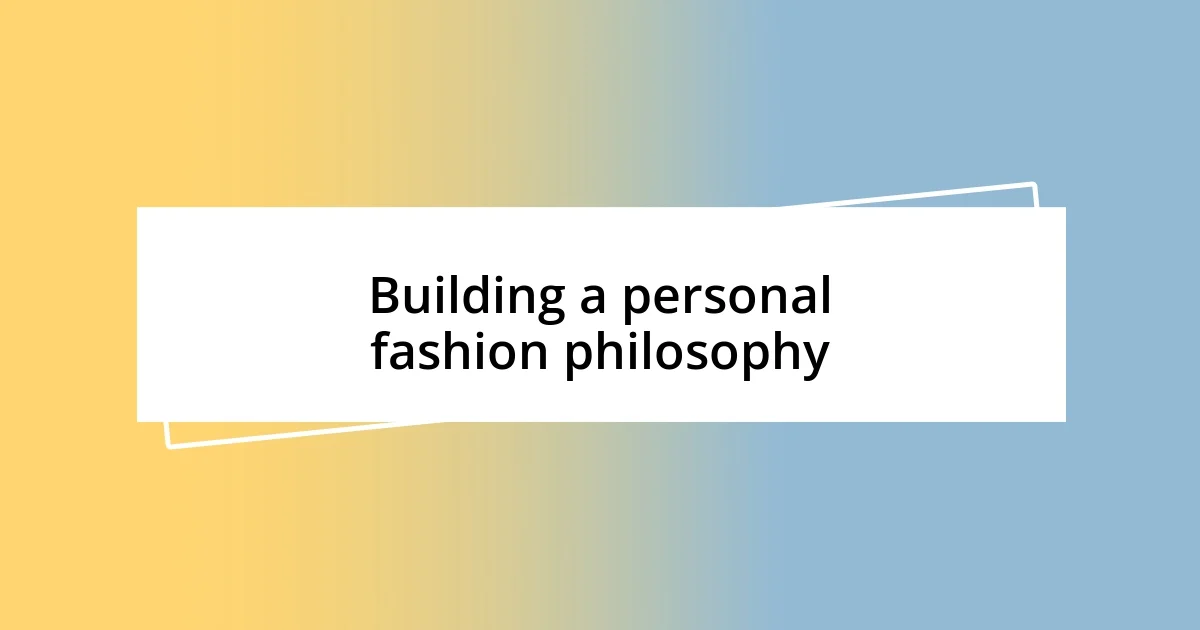
Building a personal fashion philosophy
Building a personal fashion philosophy often starts with understanding what resonates with you on a deeper level. I recall the moment I decided to declutter my closet and keep only those pieces that sparked joy. Surprisingly, this wasn’t just about clothing; it turned into an exploration of my values and preferences. Have you ever thought about how much your wardrobe reflects your story?
I’ve always been intrigued by the idea that fashion can serve as a canvas for self-expression. One afternoon, I played around with mixing patterns and colors that I’d previously thought clashed. When I stepped outside wearing that eclectic ensemble, I felt an exhilarating blend of freedom and confidence. Isn’t it amazing what happens when we let go of the ‘rules’ and embrace our unique aesthetic?
As I’ve developed my fashion philosophy, I realized that it’s not static—it evolves with my experiences and emotions. I’ve learned to embrace pieces that resonate with my current mindset. For instance, during a tough week, a cozy, oversized sweater became my go-to for comfort. This made me ponder—how does our emotional landscape influence the way we dress, and how can our choices empower us to navigate those feelings?





